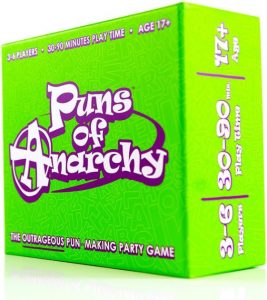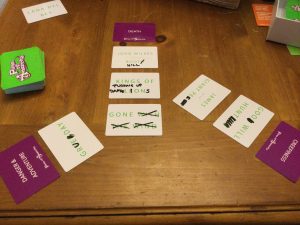| Publisher | Very Special Games |
| Design Credits | Josh Katz, Evan Katz |
| Game Contents | 310 cards (250 Punnable Cards, 60 Category Cards), six dry-erase markers, rules |
| Guidelines | Opun season on bands, movies, and more game |
| MSRP | $34.99 |
| Reviewer | Andy Vetromile |
The debate rages on: Should people who tell puns be roundly beaten, or thrust onto boats and exiled? Another contingent has stepped in to suggest they should be game designers who turn the whole state of affairs into a party game called Puns of Anarchy for 3 to 6 players.
The object is to collect ten Category Cards first. More or less.
The aforementioned pathetic souls get assigned a Category Card and a hand of three Punnable Cards and put them on the table in front of them. Then when someone says “go” or, at a bare minimum, somebody points out the game needs to eventually start, everyone begins scribbling furiously. They try to reconstruct the cards on the table to say something else that plays into the cards in front of their opponents. So for example if someone has the Category Card Death in front of them and you have the Punnable Card John Wilkes Booth at your disposal, you can use the marker to change the card so it reads John Wilkes Boot Hill; cross out a few words and Gone With The Wind becomes just Gone. Put that next to the Death card, refill your hand if you’d like, and do it again. You can load up another effort on Death or switch targets and try some cute wordplay on someone else’s Category Card.
When every player position at the table has at least four cards sitting in front of them, the round ends and everyone takes a turn judging the selections. Each player looks at all the puns in front of his Category Card and chooses what he feels is the best entry; that card’s owner is awarded the Category Card he played on. Going around the table, the cards are assigned to the most successful punsters and the round is over. All the old cards are collected and discarded, hands are refilled if need be, and the whole process is inflicted again. Once a player collects their tenth Category Card, they are declared the winner (whether they like it or not). Or if the group just gets tired, or distracted by something shiny.
Component quality is key in this game, moreso than most. That’s because the cards themselves are written and scrawled on with dry-erase markers to recreate, edit, and profane what’s printed on them. Band names are sullied, movies are embarrassed, and celebrities are humiliated. George Clooney could become Gorge Clooney and Star Wars: A New Hope might end up as A New Pope, all with a few deft strokes. They clean off pretty easily with the eraser provided on the cap of each writing utensil. The lettering is large and easy to read – important given you have half-a-dozen people crowded about one table trying to read each other’s cards as they stack up in untidy pools and you need room enough to edit – and they seem designed to stick around for a while under the abuse. The pens write well without too much smudgery though they’re still dry-erase markers and are heir to all their sins.
It’s such a simple variation on the Apples to Apples style still so popular in games, but the designers are to be condem…congratulated for their clever upsetting of the apple card…er, cart…and their new take on the genre. It’s one of those ideas that seem so obvious once it’s been done by someone who knows what they’re doing. If there’s a flaw in execution it’s that you’re likely playing with friends so you know who wrote which card. Puns of Anarchy doesn’t offer the level of anonymity many other titles in this vein do, but it’s easily glossed over and not every change is so obvious as to render the “artist” visible, especially since no one is required to write and place something in front of every player and indeed can double (or triple) up on one person to increase their chances of winning that card. (Plus, everyone is a slave to fate, the hand they drew, and the heat of the moment; it may be feast or famine, that you can think of a dozen puns for one word and none for another.)
If, as Henry Erskine suggested, puns really are the lowest form of wit, this might not be the game for people who genuinely hate the idea of listening to them let alone conceiving of and writing them. But Erskine also elaborated their lower status makes puns the foundation of wit, so it’s fair to say making them the basis for a card game isn’t just clever, it’s a high form of praise for Puns of Anarchy and a whole lot of fun.



